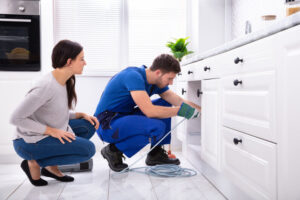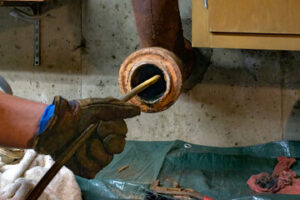Drain Cleaning Tampa might not be at the top of your to-do list but proactively scheduling this service can save you money in the long run. Here are some of the top benefits to getting your drains cleaned professionally.

Slow or clogged drains create perfect habitats for bacteria, fungus and molds to thrive. These can affect your family’s health with symptoms including sickness and severe allergies.
Clogged drains can result from a wide variety of issues. Fortunately, many of them are easy to take care of on your own.
Hair: Hair easily goes down the drain with water, but it can accumulate inside the pipes and clog them over time. This is especially common in bathrooms. Soap Scum: Greasy soap residue and particles can build up inside your drains, causing them to overflow. This is often a problem in kitchens as well as baths.
Fats, Oils and Greases: These substances can solidify in your drains, clogging them. Using an enzyme-based cleaner like Bio-Clean can help break down these types of blockages. However, this product doesn’t act as fast as chemical drain cleaners. This means that multiple uses may be necessary to fully clear a stubborn drain clog.
Other Causes: Heavy rains and storms can clog drains by washing away leaves, grass clippings and other debris. This can obstruct the flow of water and even create breaks that allow tree roots to work their way into your pipes.
How to Unclog a Pipe: If the above tips don’t solve your clogged drain, you can try pouring boiling water down it. This can help loosen the clog and wash it away with the flow of water.
Another method for clearing clogged pipes is to use a drain snake. Unlike manual plungers, these machines have a cable that feeds into your pipes. You can find a drain snake at most home improvement stores. Plug the drain, then feed several feet of the cable down the drain until you feel resistance or see that the clog isn’t moving.
Lastly, you can use a drain snake to remove more serious clogs. These devices have a hook that fits into the drain, and a motor that pulls the cable down the pipe. Once the clog is removed, flush the drain with hot water to wash away any remaining debris.
If you’ve tried all of these methods and still can’t clear your clogged pipe, call a plumber. More serious clogs require professional help to avoid costly damage to your pipes and plumbing fixtures.
Sewage Smells
Sewer smells can be a bit unpleasant. But they’re also an indication that there’s a problem with your home’s plumbing system. The smell is caused by hydrogen sulfide, which is produced when organic matter (like rotting food or human waste) decomposes in the drain pipes. Temporary exposure to this gas can lead to eye irritation and respiratory problems, but it’ll go away as soon as you get away from the source of the odor.
Foul-smelling kitchen and bathroom drains are often a sign of a blocked or clogged drain line, especially in older homes. This is because the drains aren’t designed to handle modern waste materials, like grease and hair. When these materials build up in the pipe, they create a slimy layer that traps other debris and causes a foul smell.
The first step in removing a sewer odor is to make sure that the toilet, sink, and floor drains are all properly capped and sealed. You should also flush each drain to make sure that the water in the trap hasn’t evaporated, which could allow sewage gases to enter your house.
If the drains aren’t capped, you can use a small amount of mineral oil to plug the opening and stop sewage smells from entering the house. However, be careful not to pour too much, since this can cause a clog.
A baking soda and vinegar mixture can also be a powerful drain odor eliminator. Simply combine equal parts of each substance and pour down the offending drain. The baking soda will eat away at any gunk and the vinegar will kill any lingering bacteria. You can also try boiling a pot of water and pouring it down the drain to clean and deodorize the line.
If you can’t remove the odor from your drains, it may be time to call in a professional plumber. A skilled plumber will be able to remove any blockages and ensure that your drain lines are safe and functioning correctly. Enter your zip to be matched with top-rated pros near you! It’s fast, free, and easy!
Water Damage
A clogged drain or pipe can cause flooding, serious plumbing problems and expensive home damage. It may also create unpleasant odors and water contamination. Drain cleaning helps you avoid these issues by unblocking your pipes and removing accumulated debris. It’s a simple way to improve your home’s functionality, aesthetic and safety!
A common sign of a blockage is water backing up into your tubs and sinks. It’s important to call a plumber right away if this happens because the more the clog builds up, the more likely it is for your pipes to burst or for sewage to leak into your house.
Another sign that you need a professional drain cleaning is when the toilet or shower appears to be gurgling or sucking up water. If this occurs, you may have a partial clog that can be cleared by using a plunger or drain auger. Professional drain cleaners like the ones at Walsh Brothers can use a hydro jetting technique that uses water under high pressure to safely clear even the most stubborn clogs.
Chemical drain cleaners are corrosive and can damage your pipes and plumbing system. They also pose a threat to your health, as they often contain harmful chemicals such as lye, sulfuric acid and hydrochloric acid. You should only use chemical drain cleaners in an emergency because they are so dangerous. A more effective, safer and eco-friendly option is to use a natural drain cleaner with baking soda or vinegar.
There are many things that can clog your drains, such as hair, soap scum, dental floss, food particles and grease. The best way to prevent these issues is to have regular drain cleanings done by a professional. They can use mechanical drain augers to clear out your pipes without damaging them or compromising your plumbing system.
If your drains are slow to empty or smelling bad, it’s time for a professional drain cleaning. Contact us to book an appointment with one of our plumbers. We can clean out your pipes and restore your plumbing to its full function! We offer fast, friendly and reliable service that will help you save money and enjoy a healthy and functional plumbing system for years to come.
Safety
A drain and sewer cleaning technician faces a number of hazards while performing his or her job. These include electric shock, injury from mechanical equipment, contamination from hazardous chemicals, and the potential for exposure to disease-causing microorganisms in wastewater. However, these risks can be minimized by following simple safety guidelines.
Use proper electrical safety gear when working near power tools, such as wire cutters and snakes. Avoid wearing loose clothing around the work area, as it can snag on rotating cable drums or get caught in the machine’s moving parts. Always wear leather gloves when handling snakes or other equipment that could cause cuts. Gloves should also be worn when handling chemical drain cleaners, as they can prevent contact with the harsh chemicals that may irritate skin and eyes.
Some chemical drain cleaners are caustic and can cause serious chemical burns if they come into contact with the skin. They can also corrode metal pipes and damage septic systems, and they often give off toxic fumes that can be dangerous to breathe. In addition, these products are bad for the environment, since they can contaminate groundwater and waterways and leave bottles with residue that end up in landfills.
For safer options, try natural drain cleaners that are safer for both the environment and your pipes. You can make your own all-natural drain cleaner using baking soda and vinegar, or you can purchase a biological drain cleaner that uses bacteria to break down organic waste and grease in pipes.
While performing drain and sewer cleaning, be sure to keep a safe distance from the clogged pipe. A clogged pipe can throw debris into the air, and this debris can then fall onto you or someone else working nearby. If the clogged pipe is located under your home, it’s especially important to be careful not to drop or knock anything down inside.
Preventing drain clogs is the best way to keep your plumbing in good condition and avoid costly repairs. Clean your kitchen and bathroom drains regularly, and make sure to only flush items that are designed to be disposed of in the toilet. For example, do not put coffee grounds or eggshells in the garbage disposal and never flush non-flushable items such as sanitary napkins or paper towels.
